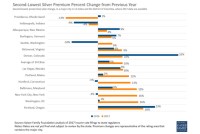Latest KFF Health News Stories
Study Promotes Battlefields’ Lessons To Advance National Trauma Care
A report from the National Academies of Sciences, Engineering and Medicine calls for the White House to lead a national strategy to promote and continue advances in trauma care.
Study Projects Sharper Increases In Obamacare Premiums For 2017
A Kaiser Family Foundation analysis forecasts rates could jump 10 percent next year in 14 major metro markets.
By Sharing Painkillers, Friends And Family Members Can Fuel Opioid Epidemic: Study
New research also highlights the public’s lack of knowledge regarding the proper ways to store and dispose of these highly addictive prescriptions.
As Hospital Chains Grow, So Do Their Prices For Care
The average patient stay costs $4,000 more at Sutter and Dignity hospitals than at other California medical centers, study shows.
Study Suggests Federal Standard May Be Thwarting Some Transplant Patients
Researchers report that performance standards set by federal health officials may have led to many patients being dropped from transplant lists without improving survival rates.
Despite New Access To Health Insurance, Drug-Treatment Rates For Ex-Offenders Barely Changed
More emerging prisoners are covered by Medicaid, but they still face barriers in navigating the health system, researchers said.
Factors Beyond Coverage Limit Mental Health Care Access
According to a new study, the health law’s insurance expansions have helped more people gain access to mental health services. But racial and ethnic disparities continue.
Young People At Risk For STDs Often Don’t Get Tested: Study
A CDC survey of teens and young adults finds that nearly half who have had sex but not been tested for disease believe they are not at risk. Yet young people account for half of all new sexually transmitted infections.
People With HIV Are Less Likely To Get Cancer Treatment
New research finds that patients infected with the virus that causes AIDS are less likely to get treatment for nine common cancers than are people who don’t have HIV.
Study Of Birth Defects, Folic Acid In Foods Finds More Questions Than Answers
But the authors caution against concluding that folic acid is ineffective.
Questions Emerge About The Impact Of State Autism Insurance Mandates
New research finds that the impact of these mandates varies because of differences in states’ coverage requirements and the availability of treatment options.
A May Health Affairs study examines how Medicare’s eligibility age affects spending and prices, as well as the volume of services used by patients.
Expectant Moms: You Have Nine Months For Delivery Decisions, You Better Shop Around
A nonprofit patient safety group devised nationally standardized measures to help pregnant women gauge hospitals on quality of maternity care.
Shortages Of Essential Emergency Care Drugs Increase, Study Finds
The problems persist even after Congress in 2012 gave the FDA enhanced powers to respond when drug levels are low.
Medicare Pays Bonuses To 231 Hospitals With Lower Quality Because Of Cheaper Costs
New research highlights the paradox in the federal program to improve hospital quality.
Opioid Epidemic Fueling Hospitalizations, Hospital Costs
New research sheds light on the growing costs to the health care system associated with painkiller and heroin abuse.
HHS Acts To Help More Ex-Inmates Get Medicaid
Obama administration broadens eligibility for those in halfway houses, but advocates for former prisoners say HHS and states must do far more.
Even As Birth Rates Fall, Teens Say They Are Getting Less Sex Education
A report by the Guttmacher Institute finds that the proportion of teenagers who are getting instructions in birth control methods is declining.
Study: Medicaid Expansion Encourages More Poor Adults To Get Health Care
Doctor visits and hospital stays were more likely for low-income adults in states after they expanded Medicaid under Obamacare, researchers reported in the Annals of Internal Medicine Monday.
Rise In Oncologists Working For Hospitals Spurs Higher Chemo Costs: Study
Researchers found that the facility fees hospitals and their clinics routinely add to the bill helps drive the price increases.

























